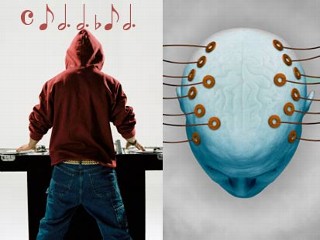Becoming More Fully Human: Music Training
 Most children are being short-changed in brain development. Much of the potential of that multifunctional tool for survival -- the human brain -- goes undeveloped due to neglect by parents, teachers, communities, and entire societies. One important human brain function -- emotional competency -- can be more fully incorporated into the developing brain via music training.
Most children are being short-changed in brain development. Much of the potential of that multifunctional tool for survival -- the human brain -- goes undeveloped due to neglect by parents, teachers, communities, and entire societies. One important human brain function -- emotional competency -- can be more fully incorporated into the developing brain via music training.Musicians heard an emotion-packed, complex sound with an enhanced sensitivity, and they also were less distracted by simple sounds, according to the study, published in the current issue of the European Journal of Neuroscience.The brain goes through very rapid growth and modification in the first few years of life. By the time a child's brain is 5 years old, most of his brain is already shaped by early experiences. But important developmental windows will open and close over the next several years -- and a child's mind is not fully matured until the middle 20s.
"What we found in this study is both an enhancement and an economy of resources varies as a function of the extent of musical experience," Kraus said. "The more years the person has been playing an instrument, and the earlier the person began musical training, the larger the effect."
Although many other studies have tried to show the beneficial effects of musical training, the researchers said their findings "provide the first biological evidence for behavioral observations indicating that musical training enhances the perception of vocally expressed emotion." The findings have implications far beyond the world of music.
"The same neural transcription process that is enhanced in musicians is found to be deficient in some children with language disorders such as dyslexia and autism," Kraus noted.
The research suggests that something as basic as musical training may be a useful therapeutic device, along with other more traditional techniques.
..."Our results provide evidence for a subcortical role in the processing of emotional cues by showing that auditory brainstem responses to emotionally salient vocal sounds are dynamic, shaped by life-long, multisensory experience with auditory signals," the researchers note. "These responses are not hardwired but malleable with extensive auditory training."
In other words, we aren't just who we are. We're also what we have done. _ABCNews
We know that infants not exposed to sight or sound in early infancy will lose much of their brain's ability for fine distinction of auditory and optic stimuli if later restored. Children who are not exposed to language in the early years will never develop any language skill. Children not exposed to music before the age of 10 or 12 will find it difficult to achieve mastery from later training. The same opening and closing of developmental windows applies to frontal lobe functioning: the best time to teach a child pre-frontal executive functions that are so vital to life success, is between the ages of 4 and 6-7. Waiting any later will doom a child to lesser degrees of success than he would have otherwise been capable of.
The brain has its own schedule of development and maturation. If caretakers of children are not willing to work within those developmental windows that are constantly opening to some functions and closing to others, too bad for the child.
Labels: brain research, developmental windows, music, music training

0 Comments:
Post a Comment
“During times of universal deceit, telling the truth becomes a revolutionary act” _George Orwell
<< Home